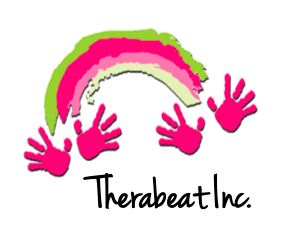Music therapy (MT) professionals are often searching for new, music-based, creative interventions and approaches to support children and adolescents with a myriad of diagnoses. Those who conduct research in the MT field have provided many approaches, interventions, and case studies which demonstrate the success of MT to improve social skills of children and adolescents with Neurological Developmental Disorders (NDDs) such as Autism Spectrum Disorder (ASD). Below is further support as to why MT services for children and adolescents with NDD is important and often successful in improving social competence.
Music, a multi-modal approach, facilitates many developmental skills. When children experience joy and play, they are more willing to participate in activities. Music is motivating and uplifting, but can also calm and relax clients. MT interventions are designed to set clients up for success and therefore help children feel better about themselves and others. Music often encourages socialization, self-expression, communication and motor development. Through music, those with NDD or ASD are able to self-manage pain and stressful situations. Elements of music are malleable, making it an appropriate therapeutic tool for many diagnoses as it can be tailored to each individual.
According to the American Music Therapy Association (AMTA), those with ASD have a heightened interest in music and often display positive responses to music, making it an integral therapeutic tool while working with them (2012, p. 1). Social skill deficits are addressed through music performance, movement to music, and improvisation. According to Gooding, MT interventions “improve social skills and specific deficits within the social skills areas of peer relations and self-management skills” (2011, p. 440). MT interventions with children often address cooperation, communication, positive peer interactions, focus of attention, impulse control, delayed gratification and accepting consequences.
As a result of MT intervention, children and adolescents with NDDs may have less outbursts at school, less behavioral reports from school, and improved social interactions. Below is a case study:
Client: Client A is a teenage male who is a sophomore in high school. Client A struggles with impulse control and often throws items for attention. This occurs within his home and while at school.
Session: The treating MT, and MT intern (MTI), addressed impulse control and social-emotional development skills through turn-taking interventions, start and stop interventions, and emotional-regulation interventions. To facilitate movement to music and positive social interaction, the MTI used a Sony speaker to project the pt’s preferred song “Count on Me” by Bruno Mars. The MTI then stood in close proximity with Client A, began to dance with them, smiled, and used positive verbal affirmations to further encourage Client A’s positive social behaviors. When the MTI affirmed Client A’s positive reactions to the music, Client A made eye contact with the MTI and reached for their hand in order to dance together. This intervention used music as motivation, close proximity and bright affect to encourage social interaction, and was in the safety of the client’s own home. As the MTI and Client A sang along together, Client A experienced positive music-making AEB smiling, dancing, and vigilance to stimuli throughout intervention. After 3 weeks of treatment plan, Client A decreased frequency of throwing household items from 3 to 1x per session. The treating MT and MT intern will continue to add to Client A’s social skills toolbox as they continue his plan of care.
In a safe therapeutic learning environment, children and adolescents with NDDs can explore, practice, and equip themselves with social skill tools for more successful experiences with their peers. As the picture above states, MT can facilitate the exploration of sharing, cooperation, listening, following directions, respecting personal space, making eye contact, and using culturally appropriate manners, among many other skills.
-Kathryn Trujillo, Music Therapy Intern
References
Gooding, L. (2011). The effect of a music therapy social skills training program on improving social competence in children and adolescents with social skills deficits. Journal of Music Therapy, 48(4), 440-462
American Music Therapy Association. (2012, June). Music therapy as a treatment modality for Autism Spectrum Disorders. American Music Therapy Association. http://www.musictherapy.org/assets/1/7/MT_Autism_2012.pdf
